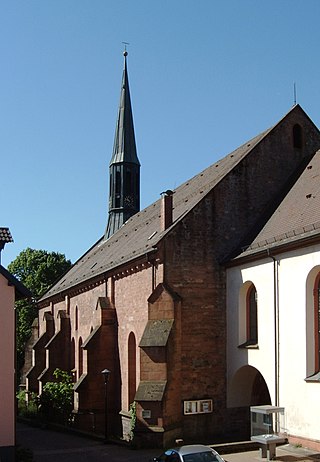
Mannheim, officially the University City of Mannheim, is the second-largest city in the German state of Baden-Württemberg, after the state capital of Stuttgart, and Germany's 21st-largest city, with a 2021 population of 311,831 inhabitants. The city is the cultural and economic centre of the Rhine-Neckar Metropolitan Region, Germany's seventh-largest metropolitan region with nearly 2.4 million inhabitants and over 900,000 employees.

Walldorf is a town in the Rhein-Neckar-Kreis district in the state of Baden-Württemberg in Germany.

Wiesloch is a town in northern Baden-Württemberg, Germany. It is situated 13 kilometres south of Heidelberg. After Weinheim, Sinsheim and Leimen, it is the fourth largest town in the Rhein-Neckar-Kreis. It shares Wiesloch-Walldorf station with its neighbouring town Walldorf. Also in the vicinity of Wiesloch are Dielheim, Malsch, Mühlhausen, Rauenberg and Sankt Leon-Rot.
Baumberg is part of the city of Monheim am Rhein in the district of Mettmann in North Rhine-Westphalia (Germany) at the southern border of Düsseldorf, placed on the eastern bank of the river Rhine. Baumberg consists of an area of about 6 km2, with about 14,000 residents in 2023.

Schönau Abbey in Schönau in the Odenwald, in the Rhein-Neckar-Kreis in Baden-Württemberg, was a Cistercian monastery founded in 1142 from Eberbach Abbey. The present settlement of Schönau grew up round the monastery.

Malsch is a municipality in the district of Rhein-Neckar in Baden-Württemberg in Germany.
The Rhine-Neckar S-Bahn(S-Bahn RheinNeckar) forms the backbone of the urban rail transport network of the Rhine Neckar Area, including the cities of Mannheim, Heidelberg and Ludwigshafen.

The Frankfurt–Mannheim high-speed railway is a planned German high-speed railway between Frankfurt am Main and Mannheim.

The Mannheim–Karlsruhe–Basel railway is a double-track electrified mainline railway in the German state of Baden-Württemberg. It runs from Mannheim via Heidelberg, Bruchsal, Karlsruhe, Rastatt, Baden-Baden, Offenburg and Freiburg to Basel, Switzerland. It is also known as the Rhine Valley Railway or the Upper Rhine Railway (Oberrheinbahn).

Leimbach is a river of Baden-Württemberg, Germany. It passes through Wiesloch, Nußloch and Schwetzingen, and flows into the Rhine in Brühl.

Waldangelbach is a river of Baden-Württemberg, Germany. It flows into the Leimbach in Wiesloch.

Wiesloch-Walldorf station is in the towns of Wiesloch and Walldorf in the German state of Baden-Württemberg. The station is classified by Deutsche Bahn as a category 3 station. Leimbach Park and the Wiesloch Feldbahn and Industrial Museum are located to the north of the station, with the headquarters of Heidelberger Druckmaschinen and SAP SE on the south-western side.

The Wiesloch Feldbahn and Industrial Museum is a narrow-gauge railway and industrial heritage open-air museum established in 2001, at Wiesloch, Germany. The museum is centred around the former locomotive shed of the Tonwaren-Industrie Wiesloch (TIW) brickworks, and houses industrial equipment from large excavators to small machine tools, plus large and small locomotives.
The Deutsche Gesellschaft zur Bekämpfung des Kurpfuschertums was a skeptical association founded in 1903 for consumer protection against quackery. It opposed the Kurierfreiheit, that existed in Germany from 1869/1872 until the adoption of the Heilpraktikergesetz in 1939. The association originated after the example of the Deutsche Gesellschaft zur Bekämpfung der Geschlechtskrankheiten, and is counted as one of the predecessors of the Gesellschaft zur wissenschaftlichen Untersuchung von Parawissenschaften (GWUP).

The Ammer Valley Railway (Ammertalbahn) runs through the German state of Baden-Württemberg, connecting the university town of Tübingen with Herrenberg in the Böblingen district. It mostly runs through the valley of the Ammer river.
Michael Bacht is a German artist.

Tonwaren-Industrie Wiesloch was a brickworks which existed in Wiesloch, Germany between 1895 and 1989. It was one of the largest and most significant factories in Germany. The factory was located just north of Wiesloch-Walldorf station and was the largest employer in Wiesloch.

St. Martin is a Gothic church and the associated Catholic parish in Lorch am Rhein, Hesse, Germany. In 2002, it became part of the Rhine Gorge, a UNESCO World Heritage Site. The church features the oldest and largest monochrome wood-carved altar in Germany. Its organ from 1984 makes it also a concert venue, where international organists such as Olivier Latry have performed.

The area around Wiesloch, Germany, is a historical centre for mining, running between Roman times and the earlier 2000s. The area is situated on the eastern edge of the Upper Rhine Plain and contains large concentrations of carbonate-hosted lead-zinc ore deposits. Lime for cement is still actively mined in the vicinity, with most of the clay pits closed, and the last heavy metal mine operated until 1953 by Stolberger Zink. On top of the escarpment metals and lime have been mined, with clay and sand mined at the end of the valley floor where faulting has brought different layers closer to the surface.

Ingrid Hornef is a German sculptor, installation artist, curator and painter. She is a representative of Concrete art and became best known for using a dice as a random number generator in her series of works Alea iacta est.





















